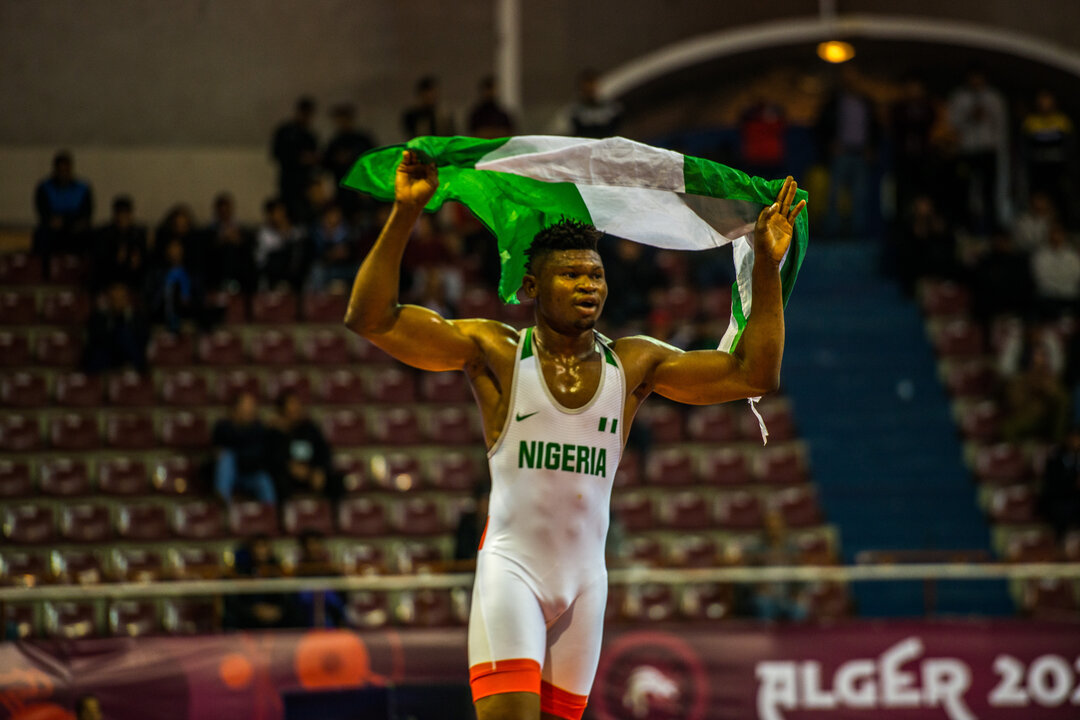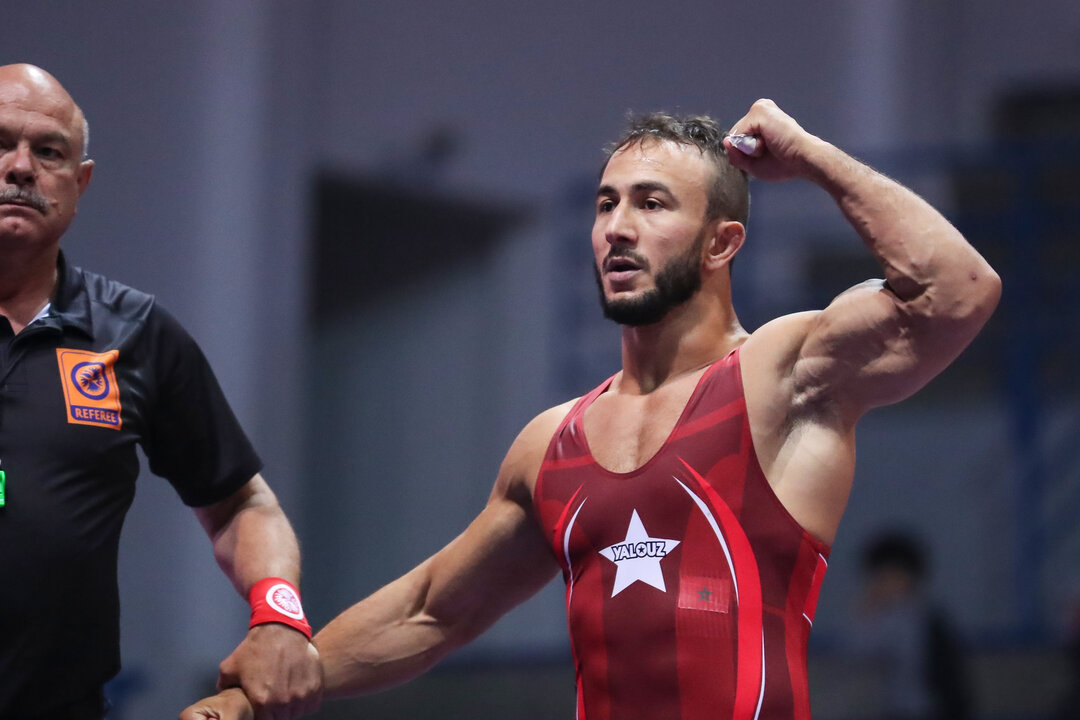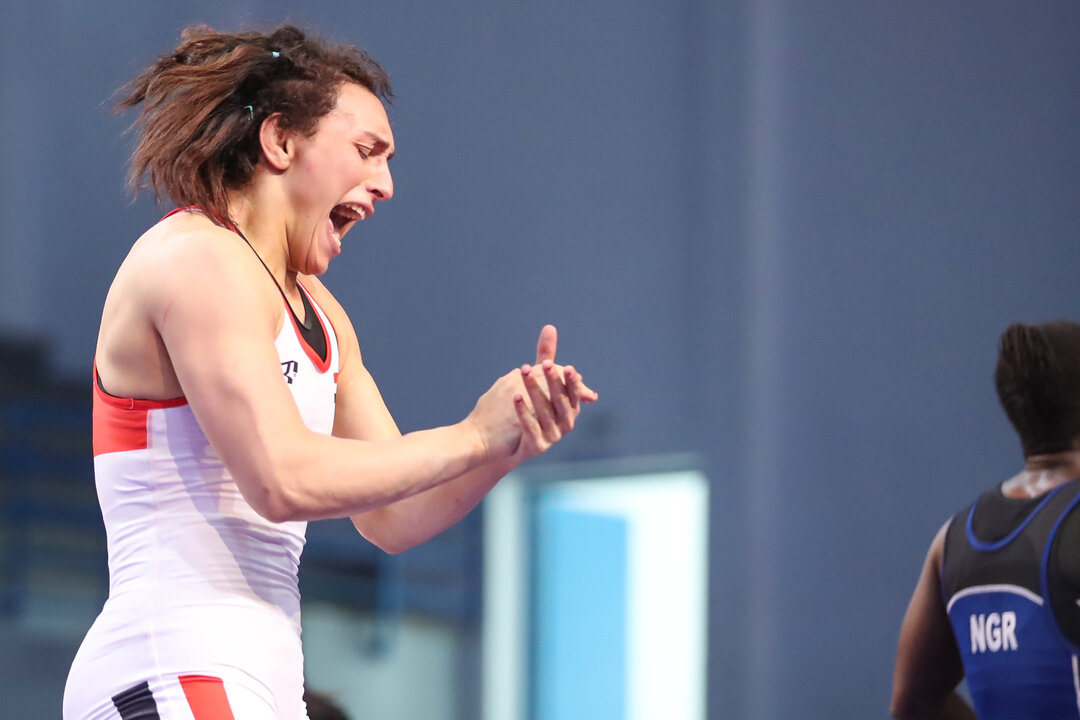African and Oceania Olympic Qualifier Entries
Wednesday, March 24, 2021 - 13:09 By Eric Olanowski

HAMMAMET, Tunisia (March 24) --- The fourth qualification event for the Tokyo Olympic Games, the African and Oceania OG Qualifier (April 2-4), kicks off next Friday. Over 150 athletes from 22 countries will attempt to finish top two in their respective weight classes and qualify their nations for the Olympic Games.
Freestyle
57kg
Abdelhak KHERBACHE (ALG)
Josh FAILAUGA (ASA)
Raoul Brillant NGANJI (BDI)
Gamal Abdelnaser Hanafy MOHAMED (EGY)
Junjun ASEBIAS (FSM)
Diamantino IUNA FAFE (GBS)
Mohamed Ismaele CAMARA (GUI)
Ethan Mikquin Tomapa AGUIGUI (GUM)
Chakir ANSARI( MAR)
Soufiane KABIL (MAR)
Ebikewenimo WELSON (NGR)
Jakobo Tanki TAU (RSA)
Saber DRIDI (TUN)
Kossai AJIMI (TUN)
Hachem HASNAOUI (TUN)
65kg
Amar LAISSAOUI (ALG)
Mostafa REZAEIFAR (AUS)
Fathi Tarek Fathi Attia ISMAIL (EGY)
Mbunde CUMBA MBALI (GBS)
Aime Mbolalalaina Joel RAKOTONIAINA (MAD)
Otmane EL BAHJA (MAR)
Abdelwahad BADRI (MAR)
Amas DANIEL (NGR)
Cristian Etpison NICOLESCU (PLW)
Reynhardt LOUW (RSA)
Adama DIATTA (SEN)
Farouk JELASSI (TUN)
Haithem DAKHLAOUI (TUN)
 Reigning four-time African champion Ogbonna JOHN (NGR) will compete at 74kg. (Photo: United World Wrestling)
Reigning four-time African champion Ogbonna JOHN (NGR) will compete at 74kg. (Photo: United World Wrestling)
74kg
Ishak BOUKHORS (ALG)
Elias Lauofo VAOIFI (ASA)
Ethan James THOMAS (AUS)
Amr Reda Ramadan HUSSEN (EGY)
Augusto MIDANA (GBS)
Mathayo Matonya MAHABILA (KEN)
Rabii REGANI (MAR)
Ogbonna Emmanuel JOHN (NGR)
Guy Robert DE LUMEAU JR (PLW)
Jaundre VAN RIEL (RSA)
Foday KARGBO (SLE)
Ayoub BARRAJ (TUN)
86kg
Fateh BENFERDJALLAH (ALG)
Nolan Ili PULETASI (ASA)
Jayden Alexander LAWRENCE (AUS)
Khaled Masoud Ismail ELMOATAMADAWI (EGY)
Bedopassa Buassat DJONDE (GBS)
Ekerekeme AGIOMOR (NGR)
Zander GERINGER (RSA)
Maher GHANMI (TUN)
Imed KADDIDI (TUN)
Sabri MNASRIA (TUN)
97kg
Mohammed FARDJ (ALG)
Ariston Faamalosi BARTLEY (ASA)
Thomas John Mcglinchey BARNS (AUS)
Ulrich Elyse MANOUAN (CIV)
Hosam Mohamed Mostafa MERGHANY (EGY)
Anas LAMKABBER (MAR)
Soso TAMARAU (NGR)
Martin ERASMUS (RSA)
Kamel JAWEDI (TUN)
Chiheb Eddine CHIHI (TUN)
Mohamed SAADAOUI (TUN)
125kg
Djahid BERRAHAL (ALG)}
Tommy Dean JAMES (ASA)
Param Pal SINGH (AUS)
Diaaeldin Kamal Gouda ABDELMOTTALEB (EGY)
Ahmed SEREHALI (MAR)
Johannes Jacobus KRIEL (RSA)
Thiacka FAYE (SEN)
Abdelmoneim ADOULI (TUN)
Greco-Roman
60kg
Abdelkarim FERGAT (ALG)
Josh FAILAUGA (ASA)
Haithem Mahmoud Ahmed Fahmy MAHMOUD (EGY)
Fouad FAJARI (MAR)
Abderrazak ROUINB I(MAR)
Romio Ricardo GOLIATH (NAM)
Mohamed Yassine HKIRI (TUN)
Salim HAMDI (TUN)
Mehdi JOUINI (TUN)
67kg
Abdelmalek MERABET (ALG)
Bilal EL BAHJA (MAR)
Gert Cornelius Johannes COETZEE (RSA)
Souleymen NASR (TUN)
Mohamed Amine MALHI (TUN)
Radhwen TARHOUNI (TUN)
 Zied AIT OUAGRAM (MAR), the ten-time African champion, will compete at 77kg. (Photo: Kadir Caliskan)
Zied AIT OUAGRAM (MAR), the ten-time African champion, will compete at 77kg. (Photo: Kadir Caliskan)
77kg
Abd Elkrim OUAKALI (ALG)
Sunil SHARMA (AUS)
Wael Hamdy Mohamed ABDELRAHMAN (EGY)
Zied AIT OUAGRAM (MAR)
Richard FERREIRA (RSA)
Lamjed MAAFI (TUN)
Mohamed Aziz LANDOLSI (TUN)
87kg
Bachir SID AZARA (ALG)
Ariston Faamalosi BARTLEY (ASA)
Mohamed Moustafa Ahmed Abdall METWALLY (EGY)
Aziz BOUALEM (MAR)
Khalid SAHLI (MAR)
Edward Louwis LESSING (RSA)
Hakim TRABELSI (TUN)
Mohamed Skander MISSAOUI (TUN)
97kg
Adem BOUDJEMLINE (ALG)
Tyler Talalemotu ILI (ASA)
Mohamed Ali Elsayed GABR (EGY)
Mohamed FAIQ (MAR)
Amadu O KAMARA (SLE)
Haikel ACHOURI (TUN)
Amir ALAWAD (UWW)
130kg
Hichem KOUCHIT (ALG)
Tommy Dean JAMES (ASA)
Abdellatif Mohamed Ahmed MOHAMED (EGY)
Choucri ATAFI (MAR)
Amine GUENNICHI (TUN)
Women's Wrestling
50kg
Ibtissem DOUDOU (ALG)
Nada Medani Ashour Abdalla MOHAMED (EGY)
Debora Valeria TURE (GBS)
Adijat Avorshai IDRIS (NGR)
Sarra HAMDI (TUN)
53kg
Lamia CHEMLAL (ALG)
Irene SYMEONIDIS (AUS)
Joseph Emilienne ESSOMBE TIAKO (CMR)
Rckaela Maree Ramos AQUINO (GUM)
Emma Nekesa WANGILA (KEN)
Elisa Emma Patricia RASOANANTENAINA NOMENJANAHARY (MAD)
Wissal EL GNAOUI (MAR)
Bose SAMUEL (NGR)
Lobna ICHAOUI (TUN)
Siwar LOUATI BEN ALI (TUN)
Nour El Houda RAOUAFI (TUN)
57kg
Rayane HOUFAF (ALG)|
Nadine NDAYISHIMIYE (BDI)
Eman Essam Guda EBRAHIM (EGY)
Fatoumata Yarie CAMARA (GUI)
Mia Lahnee Ramos AQUINO (GUM)
Atika EL ASLA (MAR)
Ikram BEN HAMMOUDA (TUN)
Faten HAMMAMI (TUN)
Siwar BOUSETA (TUN)
62kg
Amel HAMMICHE (ALG)
Berthe Emilienne ETANE NGOLLE (CMR)
Zineb HASSOUNE (MAR)
Aminat Oluwafunmilayo ADENIYI (NGR)
Fatma INOUBLI (TUN)
Khouloud EL OUNI (TUN)
Marwa AMRI (TUN)
68kg
Enas Mostafa Youssef Khourshed AHMED (EGY)
Blessing OBORUDUDU (NGR)
Anta SAMBOU (SEN)
Lilia MEJRI (TUN)
Khadija JLASSI (TUN) No. 2-ranked Samar HAMZA (EGY) highlights the entries at 76kg. (Photo: Kadir Caliskan)
No. 2-ranked Samar HAMZA (EGY) highlights the entries at 76kg. (Photo: Kadir Caliskan)
76kg
Amy YOUIN (CIV)
Samar Amer Ibrahim HAMZA (EGY)
Nour JELJELI (TUN)
Zaineb SGHAIER (TUN)


 Gold medalist at 79kg in 2024, Nan CAO (CHN) will be wrestling at 86kg. (Photo: United World Wrestling / Kostadin Andonov)
Gold medalist at 79kg in 2024, Nan CAO (CHN) will be wrestling at 86kg. (Photo: United World Wrestling / Kostadin Andonov)  Asan ZHANYSHOV (KGZ) is the defending champion at 87kg. (Photo: United World Wrestling / Amirreza Aliasgari)
Asan ZHANYSHOV (KGZ) is the defending champion at 87kg. (Photo: United World Wrestling / Amirreza Aliasgari)
Share your thoughts.
Comments